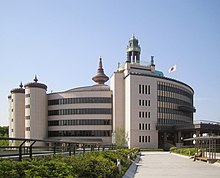Risshō Kōsei Kai

Risshō Kōsei Kai (立正佼成会), renommé Dai-Nippon Risshō Kōsei Kai (大日本立正交成会) à partir de , est un mouvement bouddhiste japonais laïc fondé en 1938 par Nikkyo Niwano (1906-1999) et Myoko Naganuma (1889-1957) tous deux anciens membres du Reiyukai[1]. Le mouvement revendique 6,5 millions de membres dont la plupart vivent au Japon.
Bibliographie[modifier | modifier le code]
- Inaba, Keishin; in: Clarke, Peter B. (2006). Encyclopedia of new religious movements, New York : Routledge. (ISBN 0415267072), pp. 539-540
- Kyoden Sutra Readings: Extracts from the Threefold Lotus Sutra, Romanized Japanese and English Translation, Rissho Kosei-kai 1994
- Morioka, Kiyomi (1994). Attacks on the New Religions: Risshō Kōseikai and the “Yomiuri Affair, Japanese Journal of Religious Studies 21 (2-3), 281-310
- Stewart Guthrie: A Japanese New Religion: Rissho Kosei-Kai in a Mountain Hamlet (Michigan Monograph Series in Japanese Studies), Univ of Michigan 1988. (ISBN 0939512335)
Références[modifier | modifier le code]
- (en) The Princeton dictionary of buddhism par Robert E. Buswell Jr et Donald S. Lopez Jr aux éditions Princeton University Press, (ISBN 0691157863), page 716
Liens externes[modifier | modifier le code]
- (en) Site officiel
